Among all rodents, rats are the most flexible animals in their habitats and nutritional preferences. They can eat anything from fruits to meat. Although rats are opportunistic feeders and don’t reject a free meal, they do have tastes. If a citrus rat moves into your garden, lemons, and other citrus fruits become its favorite food. How to stop rats from eating lemons would now be your main issue.
You can follow the below steps to protect your lemon trees from rats:
- First, maintain proper pruning and trimming of your lemon trees.
- You can use a metal guard around the trunk of your tree.
- Maintain good hygiene in your garden and keep it clean.
- Moreover, arrange a trap for rats by using their favorite bait.
Do you want to know more effective ways to keep rats away from your lemon tree? If so, read the below rat management strategies.
How to Keep Rats Out of Lemons?
According to the Northeastern Naturalist journal, roof rats are among the most common rats in Virginia state of the U.S. Journal of Military and Veterans Health claims that roof rats or black rats are the most common cause of the bubonic plague. These rats like citrus fruits and are outstanding climbers.
If you have a lemon tree, you may be unhappy to know that rats are eating some of your trees. Luckily, it is not hard to rat-proof a citrus tree. You can keep rats out of your lemon trees by adopting the below tips.
Maintain a Proper Space Between Trees
Rooftops, attics, and citrus or palm trees are popular places for roof rats to live. It is difficult to keep rats out of your yard because they are adept climbers. However, you can be cautious by keeping a suitable distance between lemon trees. You shouldn’t make it simple for rats to hop from one tree to the next.

Rats can quickly climb and move from one tree to the next if the branches are close together. Additionally, if a tree is close to your house, it will be simpler for them to climb up on your roof and enter your home. Therefore, your lemon trees should have proper space between them, away from surrounding wires and other trees’ branches.
When you plant your lemon trees, inspect that the branches don’t touch each other, and keep the recommended spacing.
Prune Trees Regularly
Rats are among the most clever rodents. They can hide easily under stooping branches of trees. The drooping twigs of a tree should not come in contact with the earth. Rats could see sagging limbs on your tree as a cover to consume any fruit that falls while remaining undetected. Regular pruning and trimming of branches will keep rats away from trees.
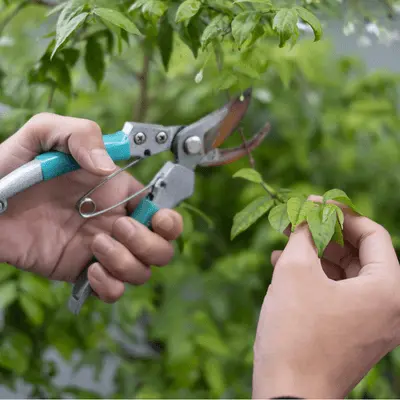
Rats usually like to keep off the ground. They jump from other trees to reach the lemon trees. You can keep rats away if you don’t let the lemon tree’s branches touch anything else.
Moreover, pruning trees may also make the earth clear and distinct. As a result, rats become discomfort and vulnerable to predators and don’t try to attack your trees.
Put Rat Guards on the Tree Trunks
According to San Diego Union-Tribune, Norway rats and roof rats harm crops to the tune of $19 billion every year. However, both types of rats cause crop damage roof rats are the main offenders behind backyard fruit destruction. They can climb from trees and chimneys. You can put guards on the trunk of your trees to prevent rats from climbing.
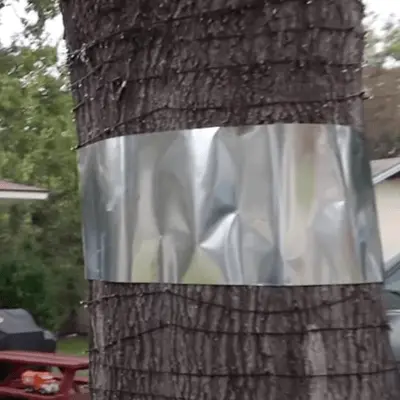
After pruning the branches, you can apply rat guards to tree trunks. You can make a simple rat guard with a sheet of metal that is 18 to 24 inches wide and two inches longer than the boundary of the tree.
To hold the sheet metal ends together without damaging the tree, use a length of wire bent into the shape of a large staple. Place the back of the wire against the tree’s trunk and thread the wire’s two ends through the sheet metal’s perforations.
Then, to hold the rat guard’s ends together, bend the wire outward at a 90-degree angle. Additionally, the spacing between trees is crucial for the effectiveness of rat guards.
Use Fertilizers
You can keep rats away from your lemon trees by using eco-friendly fertilizers. You can fertilize trees anytime from January up to the start of February.
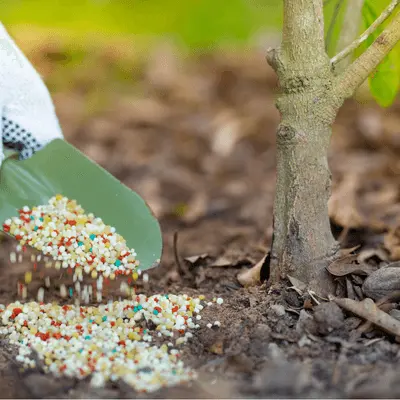
To employ fertilizers on your plants properly, you must follow below points:
- You can use organic compost or standard fertilizers.
- After selecting a fertilizer, apply it over the compost (a protective sheet on the ground).
- Remember, if fertilizer and compost are not in contact with damp soil, they cannot reach the roots.
- You can leave phosphorus in clay for a very long time to increase its concentration.
- Moreover, dormant oil can also work well to protect your plants from rats. It strangles rats, so apply it during the warm season.
Pluck Lemons When They Are Initially Ripe
Rats are attracted to the smell of food. They immediately start running to consume the fruit as soon as they smell it when it drops to the ground. Therefore, pick up any fruit that falls on your tree as quickly as possible. Remember to carefully close the trash if you plan to dispose of lemons so that rodents won’t get into your trash and infest it.

Above all, you should be aware that lemons frequently fall when there is a strong windstorm or when they are overripe. To help keep rats away, pick up lemons that have fallen from the tree and keep an eye out for lemons that might be ready to pluck.
Use Rat Bait Boxes
Bait boxes are one of the most effective ways to lure rats. You can easily trap rats by using bait boxes. You can trap some rats and get rid of them away from your property by placing bait boxes close to the lemon trees. Furthermore, you can fill bait boxes with bacon, Slim Jims, dried fruit, or even peanut butter.
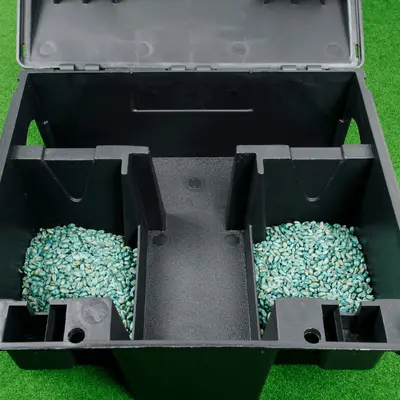
The best results will come from placing bait boxes underneath the tree and tying them to its limbs. Additionally, bait boxes may also stop non-target animals from consuming the bait. You must take preventative measures to manage troublesome rat populations because bait boxes can only apply during the non-bearing season.
Keep Your Environment Clean
According to the University of California Agriculture and Natural Resources Division (UCANR), sanitation is the foundation of keeping rats away from your trees. Rats will quickly reappear if sanitary measures are not adequately maintained, negating the advantages of other precautions.

Maintaining good hygiene in and around your buildings decreases the food supply for rats. Thus, Clear the space around your trees of any trash. Pluck the lemons as they are ripe and remove any damaged stuff.
Further, do not leave your pet food outside overnight. Remove any existing or potential nesting places from your backyard, and keep your environment clean.
Use Rodent-Resistant Birdfeeders
A rat is where the food is. Rats are fond of bird seeds. To keep your plants protected from a rat, use a rodent-proof birdfeeder.

You can make a rodent-resistant birdfeeder by below tips:
- You can use a baffle device that prevents rats from climbing into the trees.
- Place the baffle below the feeder or directly above the bird-feeder pole. It will stop rats from reaching above the tree.
- You can also use weather guards or plastic domes for bird feeders. They help in keeping rats away from bird seeds and trees.
- Moreover, beware while choosing a birdfeeder because using the correct feeder can protect your lemon trees from rats.
Install an Ultrasonic or Electromagnetic Device Close to Your Tree
You can install an ultrasonic or electromagnetic device close to your trees by plugging it into a home electrical plug-in. These ultrasonic devices emit high-frequency waves that are inaudible to humans but disruptive to rats. As a result, rats become confused about hunting food.

Although ultrasonic or electromagnetic devices can repel rats from your tree, they work best in conjunction with other repellents. Therefore, use ultrasonic repellents in combination with traps and rodent-proofing measures.
Even though there are numerous claims that electromagnetic and ultrasonic devices may keep rodents out of yards and buildings, there is no evidence that these repellents can move rats out of their homes.
Use Rat Poison
You can also prevent rats from reaching your lemon trees with poison baits. Keep in mind, if you are using poison bait outside your home, place it in a tamper-proof bait box. You cannot use poison bait unless it is guarded in a tamper-resistant bait station because it is illegal to place poisonous rodenticides within a range of kids, animals, or pets.
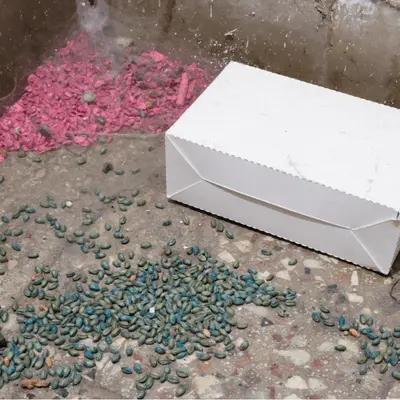
Some local governments run rodent control programs. So contact your municipality to discover if there is a rodent control program in your society.
Place Rat Traps Outside
Rat trapping provides several benefits over poisoning. Poison can harm your trees, pets, and other animals, while trapping does not. You can find a trap location by spotting a rat passage.

To set traps, you can follow these steps:
- First, choose a snap or bait trap to lure rats.
- Place traps everywhere you have seen rat activity, including at the base of the lemon tree.
- Use string to fasten traps with the lemon tree.
- You can also use an anticoagulant wax block by placing it in a bait station for trapping rats.
- Above all, put the bait station six feet up in the lemon tree.
Use Biological Control Methods
Biological control of rats by using other animals is another effective method for keeping rats out of your lemon trees. For this purpose, rat snakes are best to prevent your crops from rats. You can use different types of snakes like yellow rat snakes, gray rat snakes, and red rat snakes.
While ignoring the fruit, these snakes gorge themselves on any rodents present. Besides, owls and raptors can also prevent your trees from rats if you keep the area clean for them to prey on rats.
Moreover, you can also use cats and dogs to hunt rats. Cats may kill young moving rats, but they rarely have the strength to control an adult roof rat that has invaded their area.
FAQs
Final Verdict
Having a fruit tree is advantageous, but if it starts attracting pests like roof rats and Norway rats, it becomes a problem for you. You can tell whether a rat is consuming your fruit, but preventing it from rats is a strenuous task. Hopefully, the strategies mentioned above will assist you in keeping rats away from your lemon plants.
As a final word of advice, if you already have a rat infestation, be aware that they are hardy and may return. So if you lack the necessary skills to control rats, call a pest control company to avoid major disasters.

